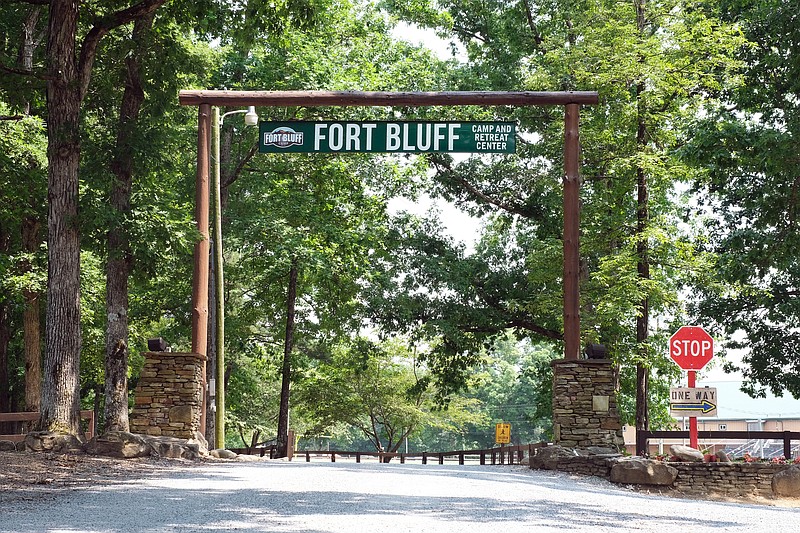An evangelical liberal arts school and a Christian athletic nonprofit group, neighbors in Dayton, Tennessee, have for years fought for the ownership of a summer camp worth millions of dollars.
In the sprawling legal dispute, judges have consistently sided with Bryan College -- until last week, when an appeals court judge ruled the case, previously dismissed by a trial court, has not been properly adjudicated and should proceed. The decision favored the National Association of Christian Athletes and pleased its president, John Ballinger.
"This has been five years of just being patient, persistent and persevering, to get to that ruling," Ballinger said by phone Monday afternoon. "We felt like the justice in the appeals court finally heard what we've been trying to say to the public and Bryan College."
He said he will be happy when the organizations have resolved their disputes, ideally out of the court system and the public eye, with the deed to the Fort Bluff Camp property back in the association's hands.
The camp, which during the summer has dozens of employees and brings in thousands of kids, is operated by NACA, but owned by the school.
But NACA argues it is the rightful owner of the Fort Bluff Camp.
The disconnect is the strange product of a tumultuous period for both institutions in which Bryan College took over the board of the nonprofit organization when it was struggling.
Then, according to the nonprofit group's arguments in court, Bryan College through those board members engaged in self-dealing as it obtained the camp and charged rent for it.
Bryan College did not respond to a request for comment by press time. But in the past it has told the Chattanooga Times Free Press that "NACA's real problem is with NACA, blaming itself for making hard decisions to solve problems that it created in the first place, then moaning about the results. If companies could break contracts made by previous decision-makers facing dire straits and do so without penalty, contracts wouldn't mean much."
In 2008 and 2009, an original founder of the nonprofit group and the camp faced accusations of sexually assaulting minors, the Times Free Press reported.
Bryan College was involved with the troubled nonprofit's efforts to sever ties with that founder. It assumed a leadership role within the nonprofit, but several NACA board members resigned over the $1 million-plus severance package agreed on for the troubled founder, according to past Times Free Press reporting.
The board members were replaced by people affiliated with Bryan College, including its president, Steven Livesay, court documents said.
For years Bryan College had struggles of its own, the Times Free Press reported. Amid low enrollment it cut staff positions while others resigned amid frustrations with leadership.
Still, the school continued to provide oversight for NACA, which was itself struggling, court documents said.
In 2016, according to court documents, NACA's board voted to transfer the Fort Bluff Camp property, valued on the order of $7 million, to the school.
The school would then assume the debt of NACA and lease it back, making NACA a renter on the property it once owned.
In a 2021 statement to the Times Free Press, Bryan College denied the land transfer was made to stabilize the school's financial standing and noted that its tax records are public.
After the transfer took place, Livesay, the Bryan College president, stepped down from the NACA board, citing a conflict of interest.
The school said in a 2021 statement that it had not been a conflict of interest for him to be on the board at the time the transfer of the camp took place because the institutions shared similar visions, among other things.
"Once the parties became landlord and tenant, Dr. Livesay decided to step down," the school said.
In 2017, the NACA board, which had evolved away from Bryan College, invited Ballinger to do a risk assessment of the organization, the Times Free Press reported. He was disturbed by what he found -- namely the overlap between the two institutions at the time the property transfer and lease agreement took place.
He appealed to Bryan College, unsuccessfully, to have those decisions undone.
Then the legal proceedings began. In 2019, Bryan College sued NACA for unpaid rent. A Rhea County judge ruled against NACA, which appealed.
In a counter complaint, the nonprofit alleged that the actions of its former board members were not made in good faith and that the lease should be voided and the camp property returned.
"The parties then inundated the court with voluminous replies to the other's motions and also provided the court with extensive briefs in support of their respective positions," court documents say.
The case proceeded in January 2020, before a judge dismissed it in its entirety the following July. There were statute of limitations issues and NACA should have sued its own board members, not Bryan College, court documents said. In August of 2020, Bryan College requested unpaid rent and attorneys fees, and the court ruled in its favor.
NACA appealed, and last week, a year and a half later, the Tennessee Court of Appeals ruled in its favor, sending the case back to the lower court for further litigation.
Bryan College could appeal to the Tennessee Supreme Court. Or a trial could proceed. Or, as Ballinger said he hopes, the organizations could heed scripture instructing Christians to settle their differences privately.
"It tells us we should not publicly air our disputes," he said. "That we should do this internally, as organizations, because of the lens it puts on the Christian faith."
Contact Andrew Schwartz at aschwartz@timesfreepress.com or 423-757-6431.
